Blog: 1038 Awesome High-Potential Amazon Niches for 2017
1038 Awesome High-Potential Amazon Niches for 2017
Inspired by the fantasy of HBO’s Westworld, I have been looking for my own adventure in a maze for the past week.
And I have found the perfect adventure: find a profitable niche for 2017.
I imagine it would look something like this:

If you’ve spent any time researching for a product or niche with high-growth opportunity, you will understand how finding a niche parallels a maze in many ways: numerous dead ends, false leads, highs and lows, excitement and the unknown.
It is a worthwhile journey though, because if you solve the puzzle and get to the end of the maze, you are rewarded with treasures. A related set of physical products that you can profitably sell online, an existing customer segment that you can market to, and many other methods of monetizing the niche.
In this post, I want to take you on the journey I took to identify a few potential niches that have potential in 2017. But more importantly, I want to share the methodology and strategies for finding niches on your own.
Even if you don’t read through some of the details, make sure that you at least skim to the list of 283 niche topics included below, or download the 800+ niche ideas to build on in 2017.
If you want to just cut to the chase and download a list of awesome niche opportunities, get it here:
What is a niche and why should I care?
A niche is tightly defined market segment that has a similar trait in common. That’s all.
Whether it is a common interest, location, demographic, or problem, this group of people share one commonality that allows them to be readily identified as a unique sub-section of a market.
A niche is tightly defined market segment that has a similar trait in common.
There are many ways to slice up a market and create a smaller sub-market to make up the niche. If you are able to layer various behaviors and interests to help you define your niche, the easier it becomes to target.
As an example, here are some niches that Google identifies in its AdWords platform, which they call “Affinity Audiences”:
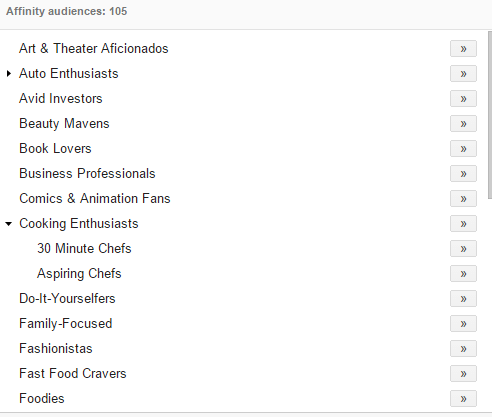
There are infinite ways to slice and dice a given market to create a niche. Which means there are plenty of opportunities for ecommerce businesses, even when competition is high.

Niches & the Amazon seller
The more important question is, “Why is it important to identify a niche for your business?”
Kevin Kelly, founding Executive Editor of Wired magazine, answers this succinctly in his essay 1,000 True Fans: you only need 1000 true fans to be a successful creator.
One thousand people is not a lot of people to gather on the internet. Ideally, for our quest to find profitable niches, we may want to identify more than 1000 people who are interested in the given topic.
However, when finding that profitable niche, more is not always better. It actually a balance between finding sufficient demand, yet limited competition. So let’s get moving on generating some ideas.
First, a few ground rules for how I evaluate niche ideas, to separate the wheat from the chaff, or the opportunities from the red herrings:
- Sufficient Demand: enough people searching for the product where we could realistically sell 5-10 units per day.
- Not overly competitive: we want to ideally find something that is obscure enough to not have cut-throat competition.
- Physical product opportunities: Our main priority is finding a niche that has a related physical product that we can sell on Amazon.
- Additional Monetization Options! (more on this later)
For a brief overview, Greg highlights 7 steps to finding a great product to sell on Amazon in this 4 minute video. Or if you have more time (like an hour and 17 minutes), it is worthwhile to watch this in action. This is actually the session where we generated new ideas, and ultimately came across the niche of “bamboo marshmallow sticks”, which have sold $200k in its first year!
Niche Source #1: Niche communities
If you are talking about online forums and communities, the conversation has to start with Reddit, the so-called Front Page of the Internet. For those who don’t frequent Reddit, it is a (fascinating) group of individual forums, called “subreddits”, that are focused around particular topics.
This is a money way to find some great niches. The assumption here is that these subreddits are potential customer niches that would purchase a product on Amazon, if it addressed a need or desire.
Reddit has an overwhelming number of subreddits. To make it easier to sift through, there is a helpful overview of subreddits organized by topic here.
Just for fun, let's start with a look at the Lifestyle topics (from Snoopsnoo’s list of subreddits):

In the wake of the America’s presidential election, maybe the Survival category will be interesting 😉
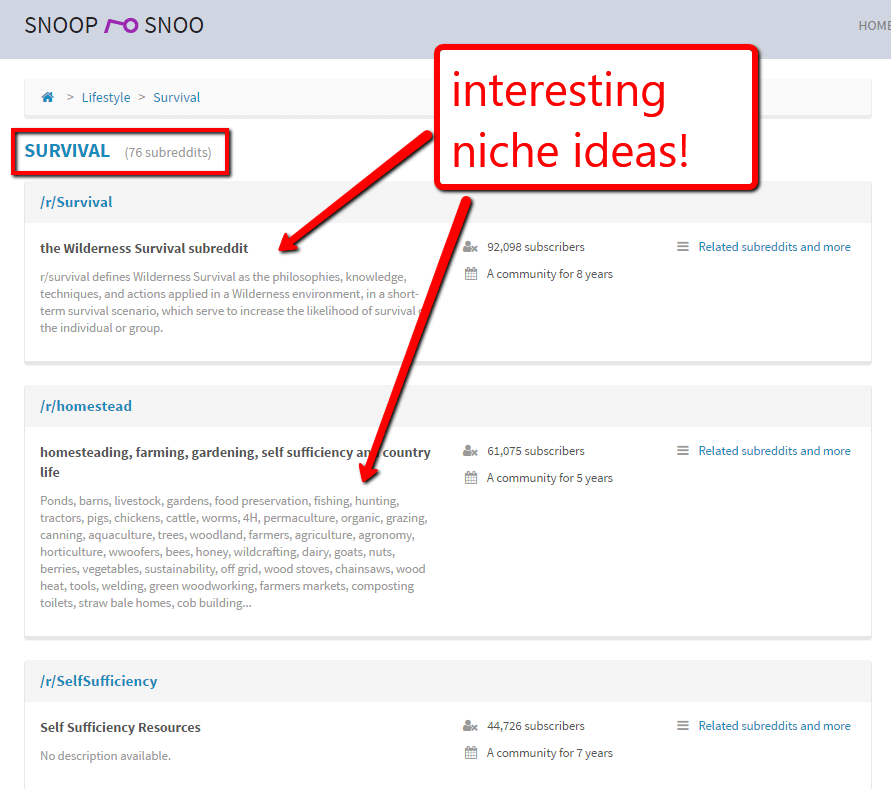
Even from looking at the summary of the subreddits, there are some great ideas.
Just looking at the screenshot above, in particular the /r/homestead topic, there are niches around: aquaculture, wildcrafting, wood stoves, welding, green woodworking, and a bunch more. Straw bale homes? Call me a naive city guy, but not sure I’d want to live in such a fire hazard!
Let’s explore “welding” just for fun. Over to Amazon we go…
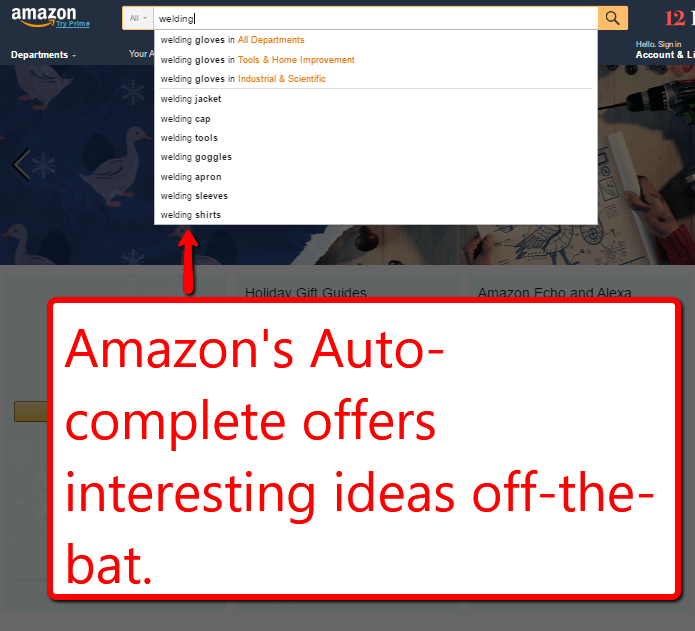
The auto-complete shows some of the most searched-for terms starting with “welding”. If we just look at the results for a very broad term, “welding”, we get the following:
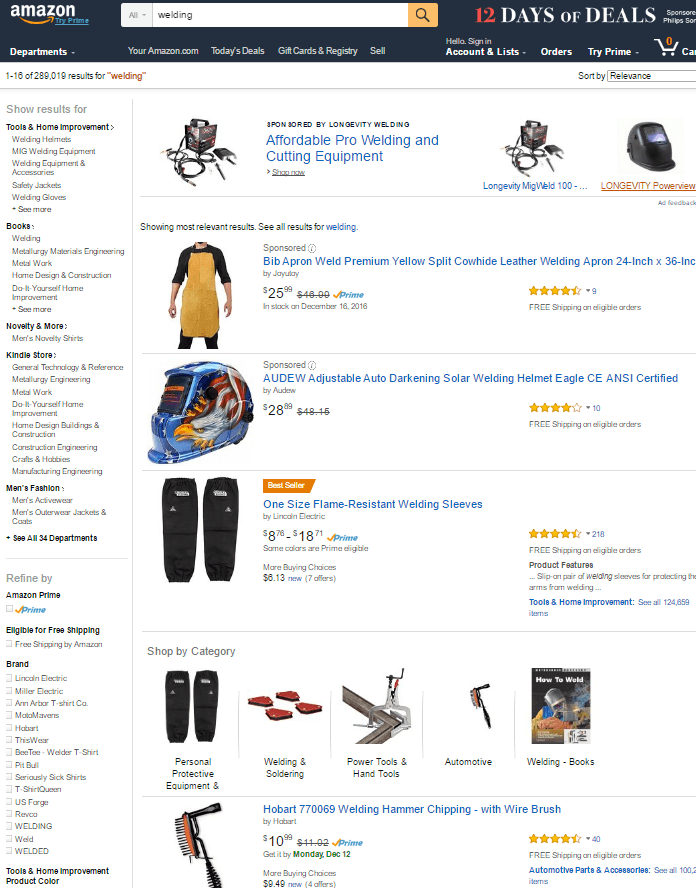
As you can see from the categories on the top left, we are in the Tools & Home Improvement category. Browsing the page, some potential products that we may want to explore within the Welding niche could be:
- Welding apron
- Welding bib
- Welding sleeve
- Welding hammer
- Welding gloves
- Welding clamp
Next, let’s pull up a few of these products within the Welding niche to see if there is potential. Using Jungle Scout, we can get an accurate estimate of the monthly sales volume to see if there is in fact demand for the product, and look at the number of reviews to see if there is room in the niche for a new seller.
The Jungle Scout Results for “welding apron“: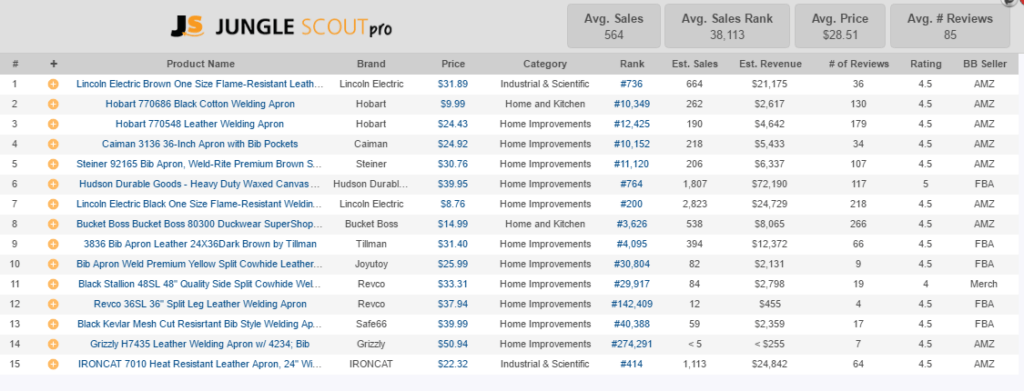
Here's my thoughts on looking at this Welding Apron data:
- Looks like good demand, based on the estimated sales for most of these products.
- The top result, Lincoln Electric, looks like it is doing quite well, 664 sales per month, and a relatively new product at just 36 reviews(!)
- I don't know anything about this niche and the main brands, but I would be curious to research Hudson Durables and Lincoln Electric, which look like they get a bulk of these sales (judging by the #6 and #7 results).
Now let's look at the Jungle Scout Results for “welding sleeve“:
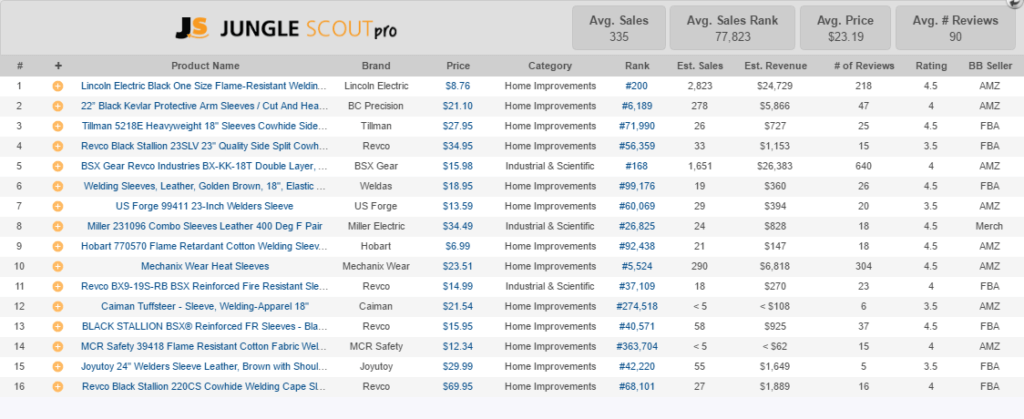
- Not nearly as many sales as for the Welding Apron results above.
- Does not look like a very competitive niche, looking at the top sellers and the number of reviews they have.
- A wide range in price, from $6.99 all the way to $69.95.
Looks like there are some good products within the welding niche as a whole, would be worthwhile to dig around and learn more about what welders have to say about these products.
You can repeat this process by finding niche communities on Reddit, explore the topics and products that are covered, and see if the niche has any product opportunities.
Proceed with caution, somehow Reddit can steal your time and you may barely notice… is that a good or bad thing? 🙂
Niche Source #2: Niche Websites from Flippa
Identifying niche websites is another great way to uncover opportunities for Amazon products.
Finding random websites on obscure topics sounds like a real pain, especially if I don’t even know what I am searching for! This is where a website marketplace like Flippa comes in handy. Flippa is a site where you can buy and sell websites. And the coolest part is that you can often see key information like the website’s URL, website traffic, monetization stats, and much more.
As we are looking for niches that we can use to sell products on Amazon, we will filter for sites that monetize with Amazon, ecommerce, and dropship. This ensures that there is a greater likelihood that there is a related physical product for the niche.
You can easily look through Websites and choose whatever filter criteria you like:
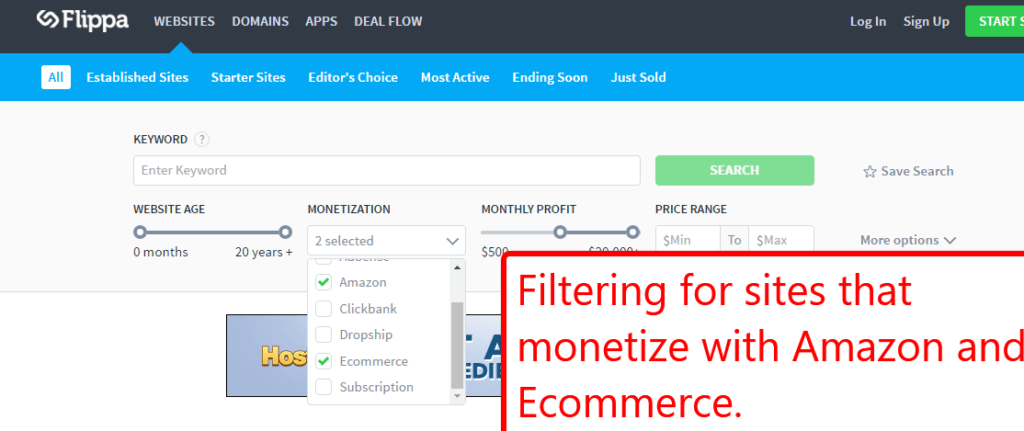
It turns out that there are thousands of websites that are on the market:
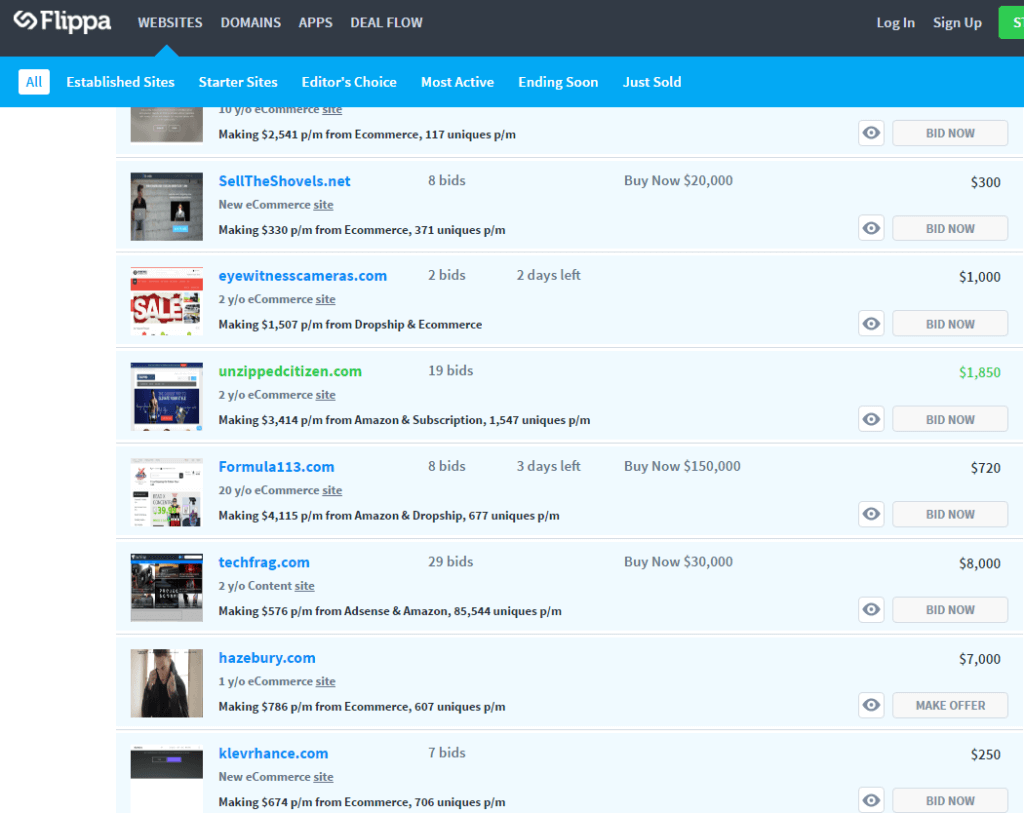
Let’s take a look at a few of the resulting sites:
- https://www.supportwear.org/ – Medical support products (ie back, ankle, wrist support)
- https://www.formula113.com – Car care products
- https://thefriendlypaw.com/ – Dog Accessories
- http://www.iceproud.com/ – Ice related products
- http://www.medicspro.info/ – Medical Equipment, Supplements, Maternity Care, Health Care
If we look at these websites, is there any potential for product or niche ideas? If we take a look at these websites, can we figure out which products are their money-makers?
For example, with Supportwear.org, it looks like they feature their magnetic back support:
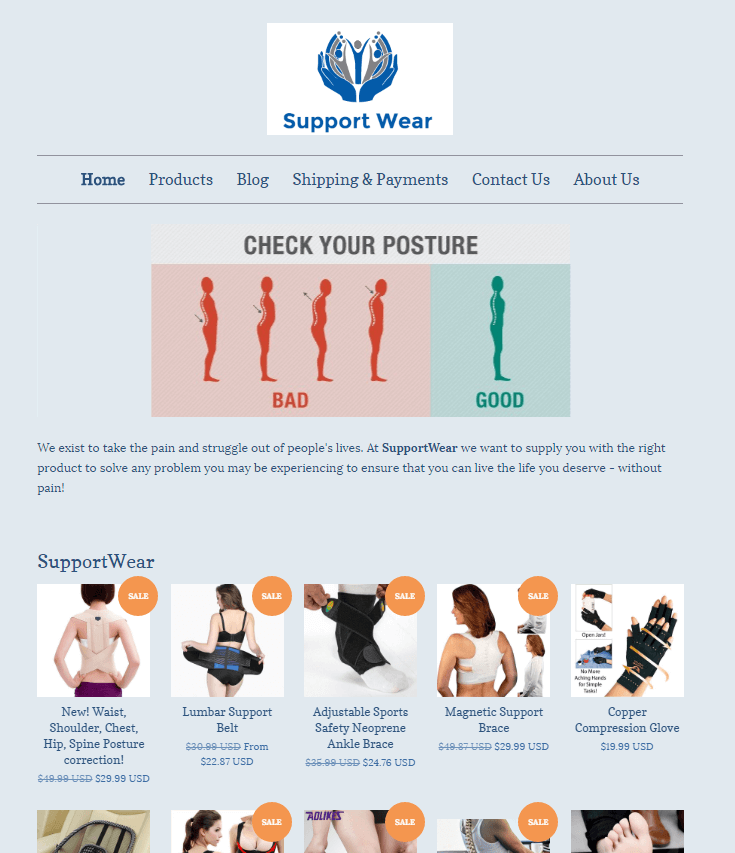
The website presumably features its best sellers on the homepage. The magnetic back brace is not something I've heard of before, maybe some potential? Let's check out the Jungle Scout results for what pops up when we search on Amazon:
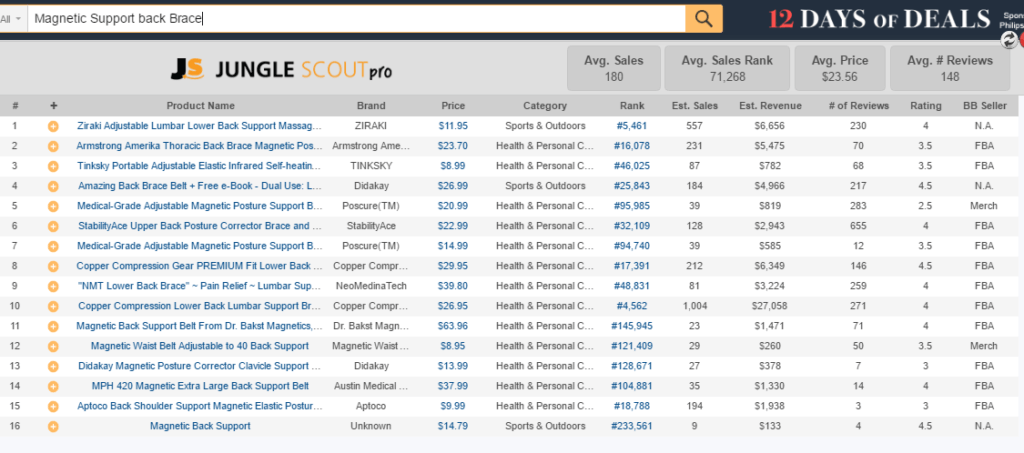
Some thoughts looking at these:
- The sales for products that come up with “magnetic support back brace” are not huge. Maybe we should try with more generic search terms, like “back brace”, “back support”, or “lumbar support”. Would there be more demand and still manageable competition?
- There are some low-priced items here. Is it a race to the bottom with pricing?
- There are a fair number of lower rated products in these top results. Is there an opportunity to offer an improved product?
Now let's look at Formula113's website, and see if there are any car or automotive related ideas that we can come up with:
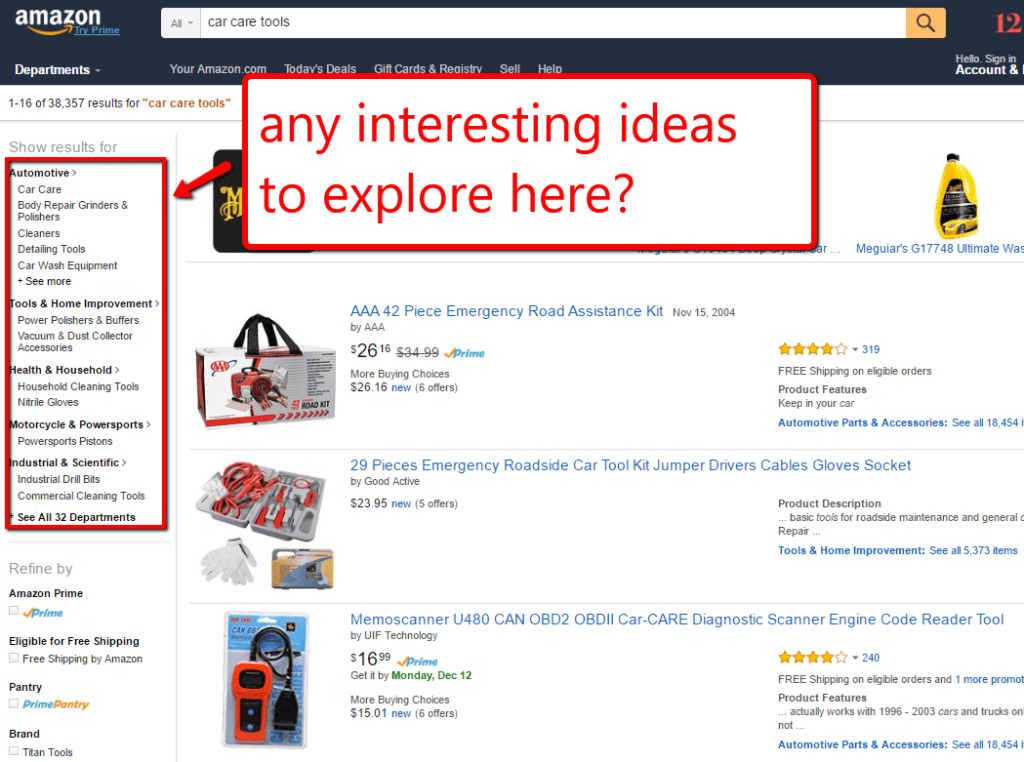
Car care tools? Here is how the Jungle Scout results appear on Amazon when searching for “detailing tools”:
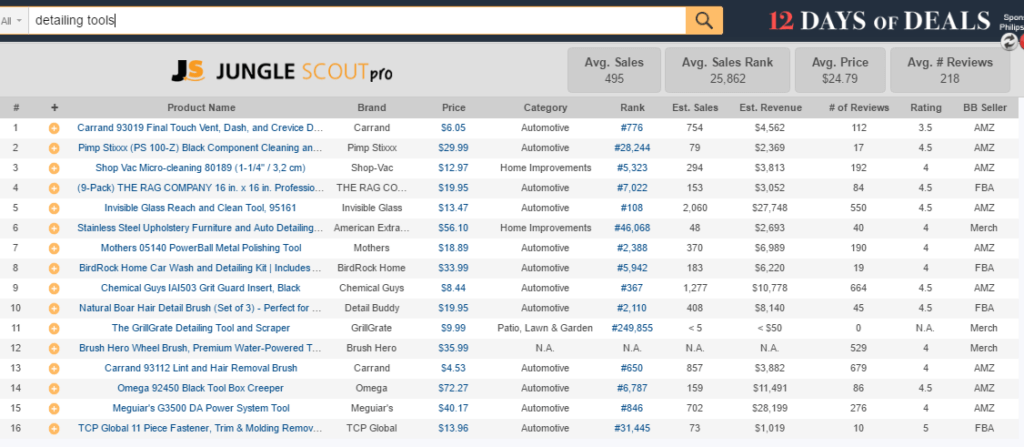
- Looks like there are a few sellers that take up a bulk of the sales for this keyword.
- Some products belong to the Home Improvements and Patio, Lawn, & Garden category. Is there another application of “detailing” that doesn't relate to cars?
- Is there enough demand to make it worthwhile to look into this further? Not a lot of demand overall here.
Repeat the process
You can cycle through this process of identifying niche ecommerce sites and cherry-picking the best selling products and check if there is still an opportunity on Amazon. As you can see, sometimes you might spot a diversion or come across even more ideas, like “detailing” within two seperate categories.
I'm not sure that the two products that we briefly looked into, Magnetic Back Braces and Car Care Tools, fit the profile of significant demand with limited competition. However, we could certainly take some time to dig into the niche more, maybe find some additional related ideas or even more specific products in the niche.
Niche Source #3: Niche Blog Topics
OK, so that Flippa methodology may be a fair amount of legwork for some underwhelming results. Not enough juice for the squeeze, as they say… what if we could just find a bunch of popular trending blog topics straightaway, and go from there?
Well, surprise surprise, we can!
Alltop is a blog aggregator that organizes blogs by topics. While Reddit is a bunch of forums organized by topic, Alltop is a bunch of blogs organized by topic.
Here is a look at some Alltops topics:
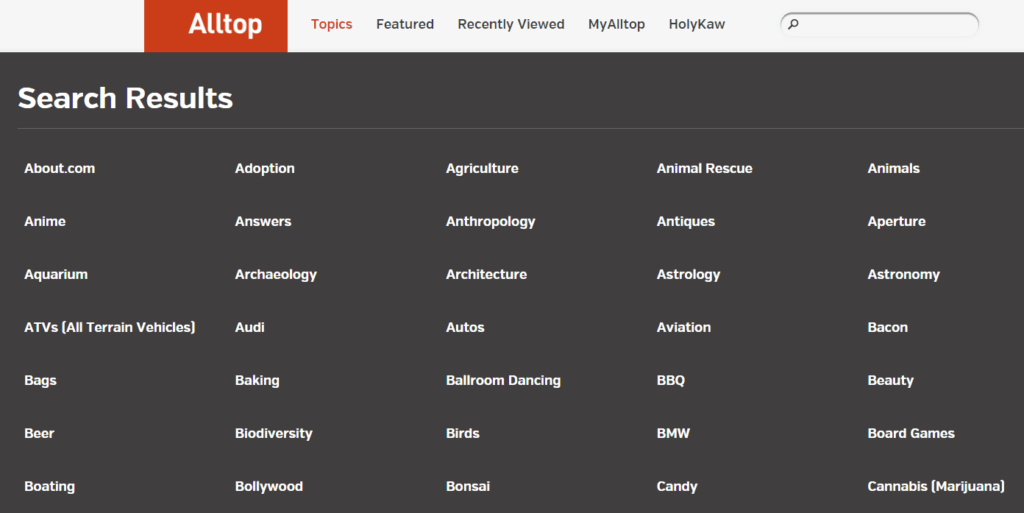
Hopefully this will help you in your niche search. A list of 238 niche topics, all of which I pulled from Alltop.
If you want to download this whole list, and 800 high-potential niche opportunities from the Niche Hunter, now is your chance!
Whew, that’s a lot!
How can you use this?
-
Use Amazon to find related product ideas
You could pop in the keyword into Amazon, like we did in the examples above. This is a good way to identify some niche product ideas. -
Use free keyword tools to get more ideas
There are some great free keyword tools out there that will offer ideas based on what people search for. These include ubersuggest, keywordtool.io, and LSIGraph. -
Find estimated sales to identify the profitable opportunities
Jungle Scout's Web App and Extension provide this sales estimate, and the Sales Estimator is a completely free way to get this information as well.
Digging into the Niches
So let's dig in to a few of these niches to see what ideas we come up with. I'd like to pull out a few that have devoted communities and probably has some products or accessories associated with it. There are actually a bunch that fit that criteria, let's try Needlework out for size.
We can start with Ubersuggest. After I drop “needlework” in the search bar, there are hundreds of results of search terms that include “needlework“:
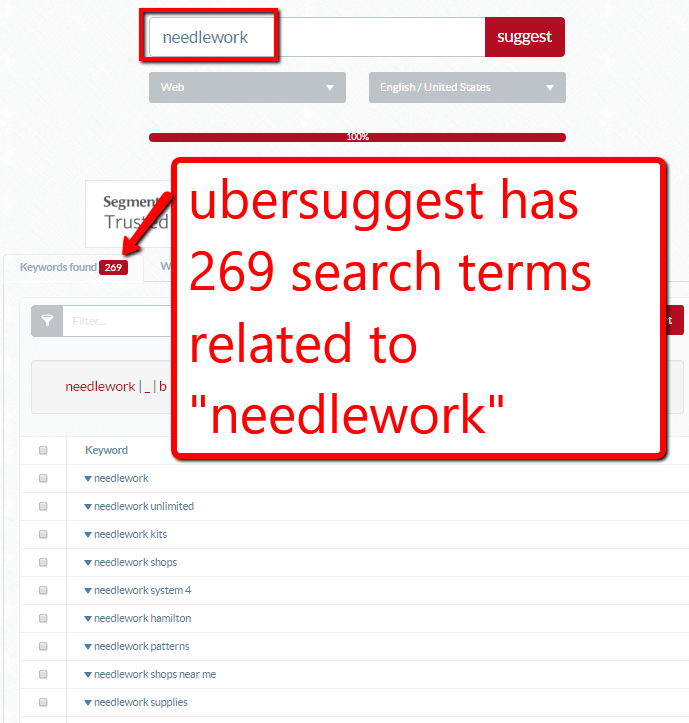
There are some helpful results for potential niches that could have an assortment of physical products related to it, for example:
- Needlework bag
- Needlework supplies
- Needlework patterns
- Needlework canvas
- Needlework gloves
And onwards. Let's just jot some of these potential niches down to explore later.
What does Keywordtool.io have to offer us regarding “needlework” related ideas? The cool feature about Keywordtool.io is that it has a list of searches specific to search engine, including Amazon. This means that the Amazon search results will be related to physical products and have some purchase-intent. Are there any helpful leads there?
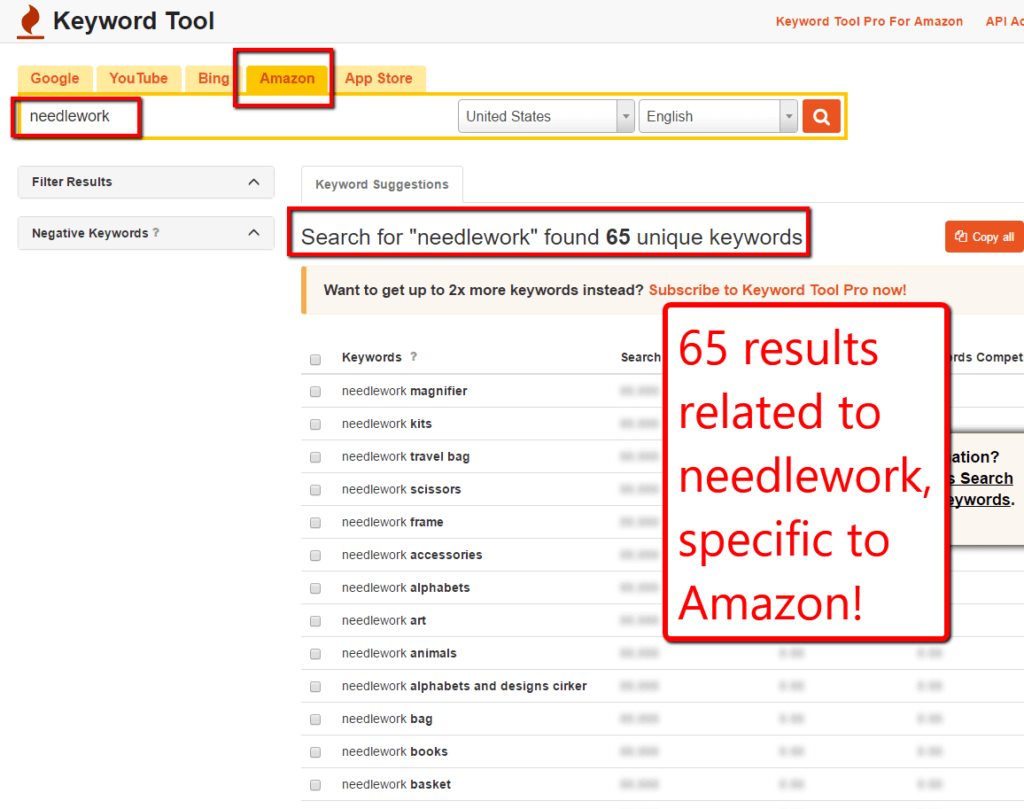
Now we can add ideas like:
- Needlework storage
- Needlework pouch
- Needlework project bag
- Needlework magnifying glass
And some other good ones. We're on a roll, I have the sense that we are moving towards the center of this maze!
Let's also check out what LSIGraph shows us. LSIGraph is great because it spits out words and phrases that are related to our main keyword. So maybe there are other related niches that we haven't even thought about yet:
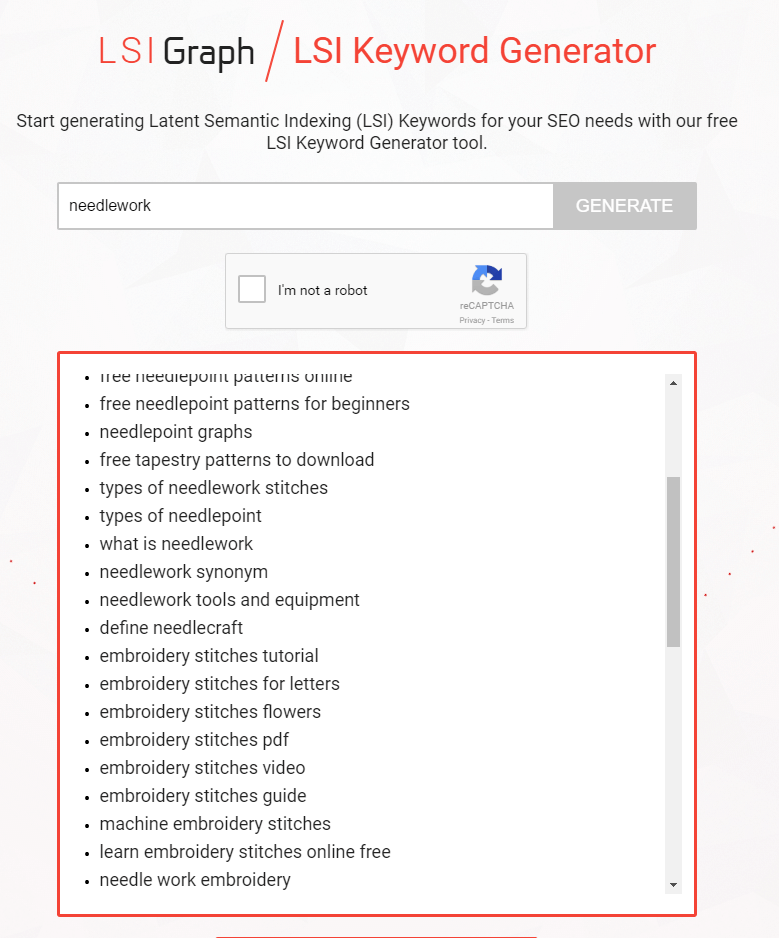
Bingo! LSIGraph shows us a bunch of search terms, in addition to related niches like, “embroidery”, “needlepoint”, “tapestry” and more.
I could cycle through Ubersuggest, KeywordTool.io, and others (Keyword Tool Dominator also has an Amazon-specific search functionality) and get additional niche and product ideas.
Answer The Public is another tool which provides you with a list of commonly asked questions about a keyword, as well as prepositions and an alphabetical list of keywords:

Niche Source #4: Jungle Scout’s Niche Hunter
So we have zig-zagged through a bunch of potential topics and niches, and started to compile a decent list.
But is there anything better than a one-click solution? With Jungle Scout’s Niche Hunter, we have collated millions of data points and sales trends to identify 3 million niche opportunities on Amazon.
To make the sorting even easier, we have organized these niches by category, and various attributes like units sold (per month), price, keyword, and more. There are also proprietary algorithms to make it dead-simple, quantifying a niche by the its opportunity, its competition, and how strong of a listing it is.
Here is a look at the Niche Hunter filter options:

Curious to learn more?
We have gathered 800 niches that show great potential going into 2017, in additioon to all of the niche topic ideas listed from Alltop.
Just for fun, I pulled 10 random niches from the Niche Hunter that we could mull over together:
- Wax warmer
- Paracord
- Leak seal tape
- Sorting blocks
- Cryovac tape
- Camelbak bottle brush
- Sinus relief spray
- Hair protein therapy
- Baby teething biscuits
- Plant desk
As a new dad of a baby just sprouting some teeth, the “baby teething biscuits” looks interesting, I have no idea what that may be…
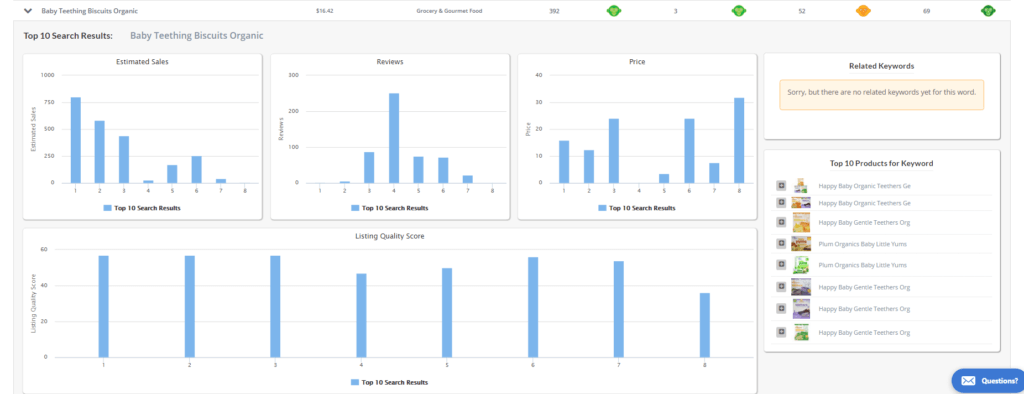
Niche Hunter makes it super easy to make an assessment with a quick glance. Color coded monkeys show the potential for various metrics, including units sold, competition, listing quality, and opportunity score.
If you click into a particular niche, you can get more information like the top 10 products ranking for that keyword, a graph showing how those sales are distributed among those sellers, the price, additional related keywords, and more.
And here are the results that I see when searching on Amazon for “teething biscuit”:
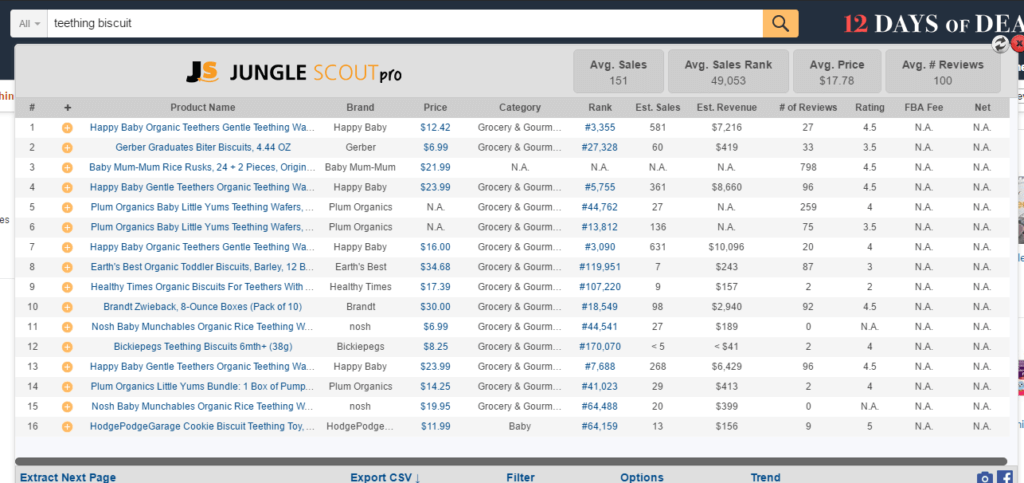
I'm not sure that I like this in particular, as it is a food product (meaning qualifications are necessary in order to sell on Amazon), and there are household names at the top of the search results.
But maybe there are other teething-related items that are physical products that we could explore? That is the fun of the Niche Hunter–great ideas to start a winding exploration into various hidden niches.
How to validate your niche/product idea demand
Great, you have had more than a thousand niche ideas thrown at you. How do you actually determine whether a niche (and the products that make up the niche) are worth your efforts of launching a product?
The answer is simple: analyze the existing demand and interest in the niche.
First, let’s just see if people are actually searching for the niche idea. At the moment, there is no reliable tool that offers search volume on Amazon. If a company claims that they have such data, raise one eyebrow and backpedal slowly. It is a ruse.

Utilize Google tools
Google offers a free Keyword Planner (data is limited unless you advertise and spend above a certain threshold).
You can access it in your AdWords account. Once you enter in a keyword or two, Google will provide an estimated monthly search volume for the keyword, and related keywords. Be wary though, as Google is known for keeping some data undisclosed, and the main intent of the Keyword Planner is to get advertisers to spend money.
Regardless, let’s just take a look at Keyword Planner for “welding aprons“, one of the ideas that we had above.

As you can see, Google says that there are an estimated 1300 searches for “welding apron” in a month. Additionally, Google provides related search terms, and the estimated monthly volume for those as well. This is helpful data to assess general demand, and also uncover some related terms.
Another helpful check is to see the Google Trends of a search term. This is going to show you at a high level if the search term, in this case “welding apron” is a growing trend (as in, how many people have searched for the term historically in Google):

The spikes show it to be a bit cyclical, but not really a growing or declining trend. This is made more clear when looking at Google Trends for the term “welding“:

Get estimated Amazon sales
Keyword volume is great, but it is ultimately just a proxy to figure out how many sales are made for a given niche. So let’s just cut to the chase and try to figure out how many sales there are for a product keyword.
The Jungle Scout Extension and Web App provide this data instantaneously. So if we search on Amazon for the top search result for “Welding Apron“, you can get these results from Jungle Scout:

A free alternative to this can be done by piecing together estimated sales by looking at the Best Seller Rank for some products in a niche, and popping it into the Free Jungle Scout Estimator.
So for example, you would pull the Best Seller Rank (for the main category, not the sub-categories) in the “Product Details”: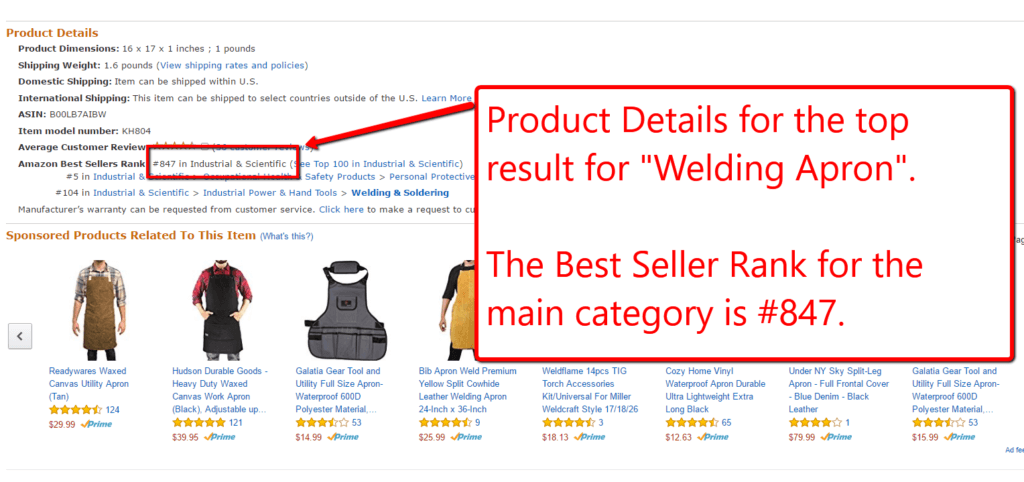
And once you have the Best Seller Rank, you can just pop it into the Estimator for the given Category, and out comes the Estimated Sales for the month. For free. Voila!
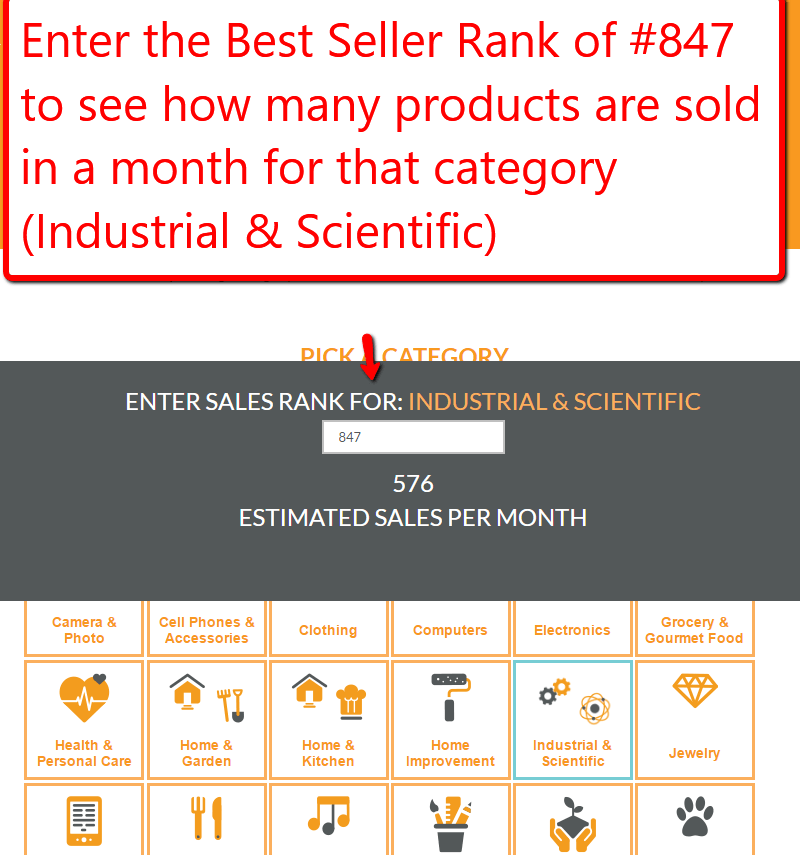
The End Game: How to monetize a profitable niche
If you have made it this far, there is a good chance that you are meant to get to the end of your Niche Hunt maze–go you!
Once you have found a niche that works for you, how do you take advantage and make money from it?
There are numerous opportunities, each with its own merits and challenges. But remember Kevin Kelly’s words, you only need 1000 true fans to really make a business work for you!
We are going to explore some of these topics in greater detail in the near future, but at a high level, you can monetize and grow your niche in the following ways (to name a few):
- Sell a product related to the niche (on Amazon, your own site, other marketplaces)
- Create a niche blog: sell Pay Per Click ads (like AdSense) on your blog
- Generate Amazon affiliate commissions from products featured on your niche blog
- Sell other affiliate products relevant to your niche
- Sell sponsored posts on your niche blog
- Write an ebook related to your niche
- Sell courses related to your niche
- Be a Consultant in your niche
- Create paid membership forums related to your niche
- Sell your niche site (remember Flippa)
Now what?
Now it’s on you to find the niche that will make your 2017 a whole lot richer.
Do you have any other techniques for finding niches that I didn’t address here? If so, please drop them in the comments! Remember, there are nearly infinite ways to slice and dice a niche, it is not a zero-sum game. So there is a profitable niche waiting out there, just for you!
